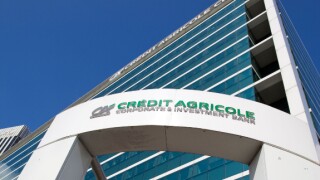France
-
A pair of large block trades this week showed the depth of Hong Kong’s equity capital market, with more than $3bn raised by conglomerate China Evergrande Group and European food products company Danone. Jonathan Breen reports.
-
Two SSA borrowers landed in the euro bond market on Wednesday while a third lined up business for next week. Issuers may still be achieving good results but bankers believe conditions are turning bad.
-
French cloud computing company OVHcloud has mandated banks for its upcoming initial public offering on Euronext Paris.
-
Believe, the French music streaming and distribution company, is looking to grab investors in what is becoming an exceedingly binary IPO market as it launches in Paris.
-
Crédit Agricole has promoted four staffers to fill vacant and newly created positions in its debt capital markets leadership team, including global head of financial institutions DCM and head of European corporate DCM.
-
Deutsche Bank scored a blowout book with its first euro additional tier one since 2014 this week, as investors rewarded the issuer for progress on its turnaround plan. Banco Santander then gave the asset class another shake, with a deal split across euros and dollars.
-
Bombardier has exited Alstom, the French maker of rolling stock, having sold the last of its shares through a €506m accelerated bookbuild on Tuesday night.
-
Carbios, the French sustainable plastics company, has unveiled plans for a €105m capital raising to finance the next stage of its growth, with the backing of major shareholders.
-
Emmanuel Regniez has left his position as head of France investment banking and coverage at Citi to take up a co-head role at Bank of America, as the latter beefs up its presence in the country.
-
-
Bpifrance is looking to become a regular issuer of green bonds, following its debut deal in the format this week.
-
Equity investors lined up for a slice of shares in Euronext on Thursday night, in a €213.7m block trade by two shareholders selling down their stakes before the company’s €1.8bn rights issue.











